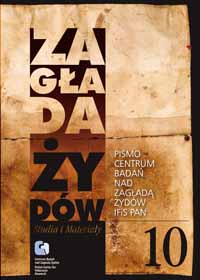Pustostan i jego perswazja. Język w ostatnim tekście Adolfa Hitlera
Empty Space and Its Persuasiveness. The language in Adolf Hitler’s last text
Author(s): Katarzyna Kuczyńska-KoschanySubject(s): History
Published by: Stowarzyszenie Centrum Badań nad Zagładą Żydów & IFiS PAN
Keywords: Adolf Hitler; Janusz Korczak; racism; LTI; euphemism; “testament”
Summary/Abstract: This article is an attempt to comment on Adolf Hitler’s “Last Political Testament” – a text without a precedent in the history and culture of the last century. Initially debating whether the document should be classified as a testament, Kuczyńska-Koschany suggests (just like Saul Friedländer) putting this genre category in inverted commas because of Hitler’s total lack of civil courage and because the style is characteristic not so much of a last will as of final orders. Hitler’s document is contrasted with Janusz Korczak’s autobiography, which he wrote six months before his death and which could be treated as his testament. After reading these two documents, in a way incomparable, it becomes clear, that they confirm their authors’ life, testifying to the emptiness and aimlessness of the former and to the authenticity and decency of the latter. Finally, a detailed analysis of the language and style of Hitler’s “testament,” which lacks neither mistakes nor dangerous euphemisms, reveals the truth about the author and the ideology which he served and whose “lackey” he was.
Journal: Zagłada Żydów. Studia i Materiały
- Issue Year: 2014
- Issue No: 10
- Page Range: 665-672
- Page Count: 8
- Language: Polish

